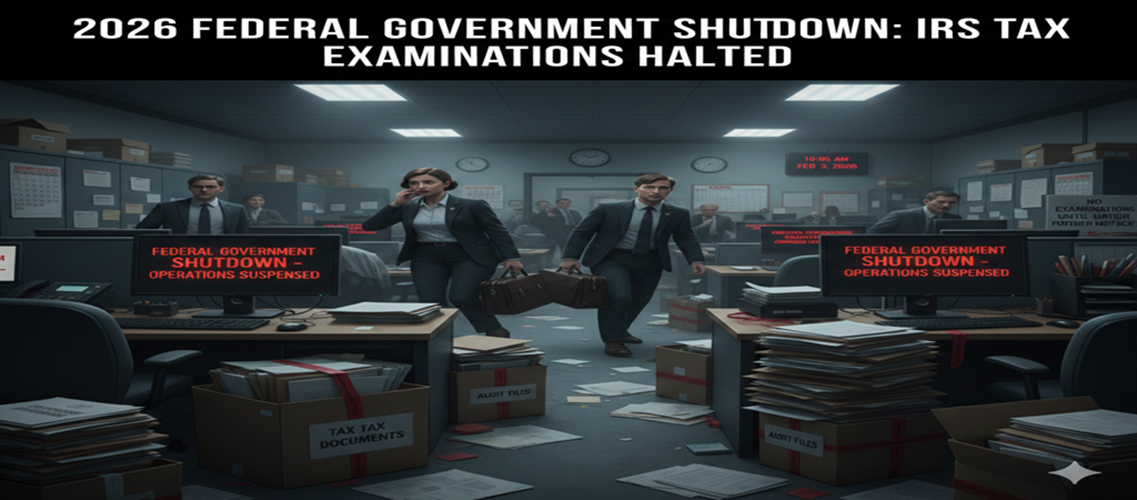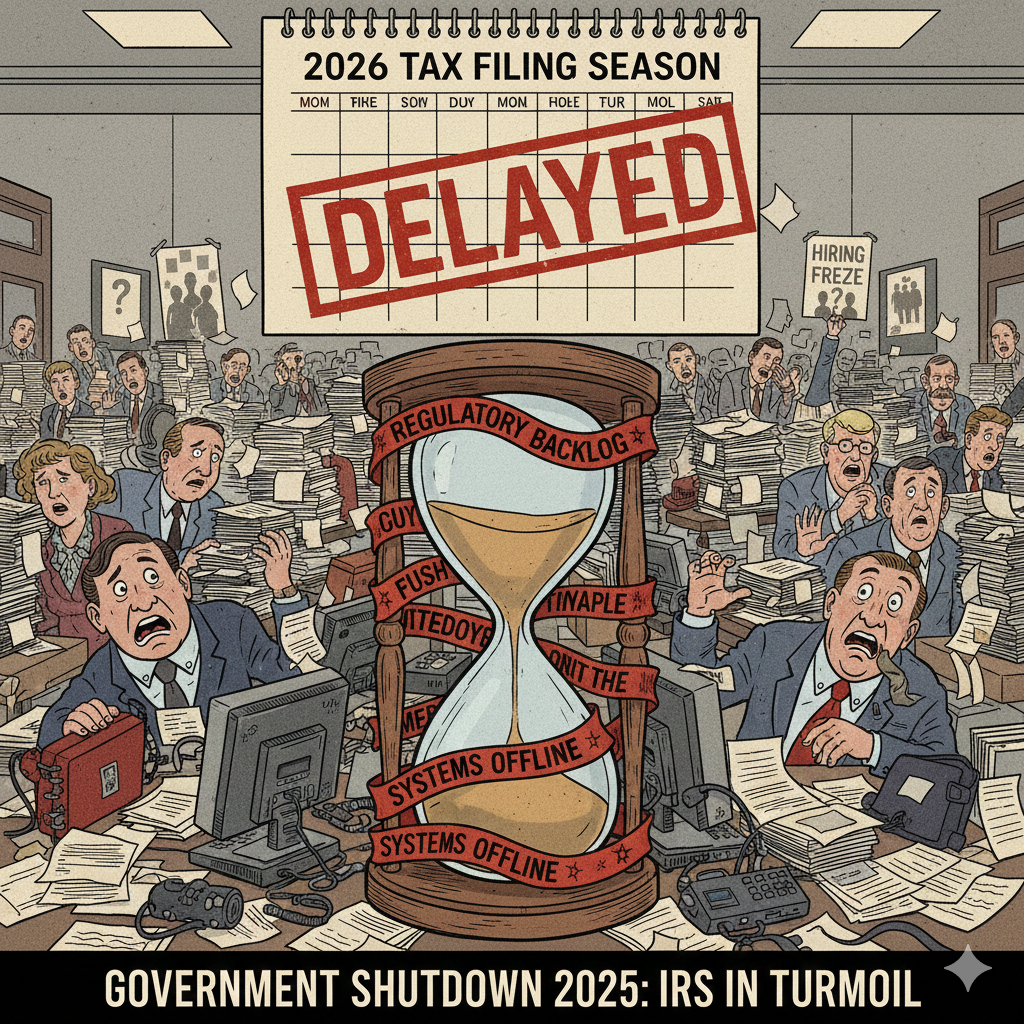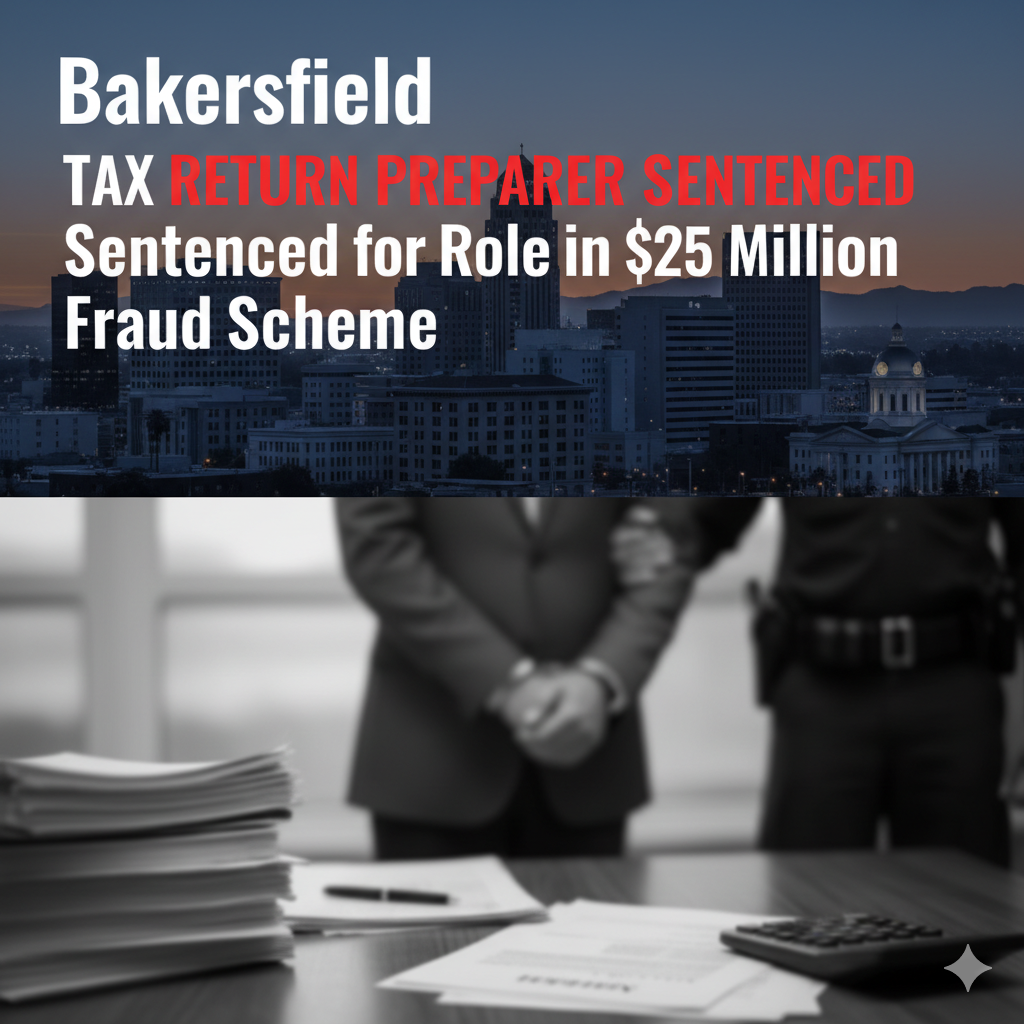How The 2026 Federal Government Shutdown Impacts IRS Tax Examinations?
Filing taxes is punishment enough without the vague threat of an IRS audit looming over our heads. For understandable reasons, the IRS insists on keeping the ins and outs of its auditing process on the murky side. How will you catch the bad guys if you give them the rule book first? But because of the sense of mystery around the process, it’s an area of regulation often misunderstood by taxpayers.
And now that we are currently under a partial Federal government shutdown with IRS employees not reporting to work, there is a lot more anxiety among taxpayers because their tax disputes are in limbo.
Six Common Myths About The Dreaded IRS Tax Audit –
Myth #1: Only the wealthy get audited.
While it’s true that big businesses and the uber-rich are often targets of IRS tax probes, that doesn’t necessarily mean low- and middle-income workers are free and clear. The agency is increasingly relying on data mining and robo-audit systems to detect errors in tax returns, which has actually made it easier to go after small-fish taxpayers.
In 2018, the IRS audited 520,000 of the 153.9 million tax returns filed – an overall audit rate of 0.3% but a substantial portion of those selected for audit involve taxpayers with an adjusted gross income of less than $1 million. One of the biggest reasons behind this trend is the IRS’s move to pursue people who fraudulently claim the Earned Income Tax Credit, a juicy tax break that for calendar year 2024 is worth an average $7,830 for a family of five earning less than $66,819 a year. IRS estimates that around 33 percent of EITC claims are paid in error. Some of the errors are unintentional caused by the complexity of the law, but some of the claims are intentional disregard of the law.
If you really look at the scrutiny of low- and middle-income wage earners, there is much more detailed scrutiny now than for those with investments and other sources of income. It just takes fewer resources to audit lower-income earners. And in all fairness to the IRS, Congress hasn’t been exactly generous with budgets. It was only until the Inflation Reduction Act of 2022 was signed into law by then President Biden that IRS was promised additional funding over the next 10 years. But now that Trump is serving as President and the Republicans control Congress, this additional funding is in serious jeopardy.
Myth #2: An audit means you’ll have an IRS agent knocking down my door
If the IRS’s computer system flags your tax return, you’d be hard-pressed to get an agent to pick up the phone, let alone make a house call. The traditional IRS audit and someone showing up on your doorstep is a thing of the past.
For starters, the IRS does not have the manpower. Thanks to rounds of budget cuts, the IRS has had to reduce staff and has no time or expense to send out agents to your home or office. Additionally, with the fraud and personal safety issues of strangers coming to your doorstep, the IRS is not looking to put their agents in danger or commit additional resources to prove to taxpayers that the officials who are making the house-call are genuine IRS agents.
That is not to say that IRS stopped doing field visits but if your return is flagged, the initial contact will likely be a letter in the mail seeking additional information. From there, you can either answer by return mail or call them directly.
Myth #3: If I owe tax money, the IRS will be after me in a hurry
Rest assured, if IRS flags your return for suspicious activity, you will hear from them at some point — but probably not for a year or two…or more. The IRS normally has three years to go after questionable tax returns, and with personnel shortages, even taxpayers who willingly call them to sort out issues have a hard time getting them resolved.
Millions of phone calls to the IRS still go unanswered as most people don’t want to wait sometimes for hours to get through to a human being. It is not uncommon that the phone lines are closed due to technical problems or heavy traffic.
The IRS is under-funded and under-staffed. If a consumer calls the IRS, when they get through to a human being, they will likely just be told where to find the answer on the IRS website.
Myth #4: If I file for too many deductions and tax credits, I’m setting myself up for an audit
Tax credits and deductions are there for a reason: to ease the tax burden for workers who need it most. Don’t let the threat of an audit dissuade you from applying for tax credits and deductions you’re justifiably due.
Despite the IRS’s efforts to crack down on Earned Income Tax Credit fraud, it is actually one of the most commonly overlooked deductions.
Home-office deductions are another oft-cited target for the IRS. But it’s an overblown fear that hardly applies today, when there are more than 42 million Americans working as freelancers and independent contractors.
This was once the case, back when working from home was less common but with millions of home offices running today, the system is far more accommodating for home office users. The important thing to remember: Make sure you keep your receipts and documents and only deduct legitimate business expenses… which mean that the expense must be typical and necessary for your business.
The bottom line: If you’ve earned a tax credit or can justifiably claim a deduction, do it. Just make sure you’ve done the research and know what you need to back up your claim first.
Myth #5: I’ve got my tax refund so I don’t have to worry about an audit.
Even if your tax return was accepted and you cashed your refund check, you’re still fair game for auditors.
The IRS uses a special matching system that tracks each taxpayer’s W-2s, 1099s and 1040 forms. If it turns out that you’ve under-reported your income, the system will eventually catch up to you.
You could get your refund, and about one or almost two years later, if there’s a problem with your taxes, you’ll likely get a letter in the mail from the IRS.
As noted above, the IRS has three years to track you down, but in extreme cases of underreporting or tax evasion, they can basically come after you whenever they want.
And that’s not even the worst part. Any interest and penalties owed on your unpaid taxes will start accruing the day your taxes were due — not two years later when the IRS letter finally shows up in your mailbox. Two years of compounding interest and penalty charges will only add salt to the wound.
Myth #6: If I hire a tax attorney, the agent will go hard thinking that I have something to hide.
You should recognize that the agent has many audits assigned to him or her and needs to report progress to the group’s supervisor. The more time that an agent has to spend on one case, it takes away time from other cases.
It is for that reason that agents prefer to deal with a tax professional representative as they know how information should be presented and the agent need not spend the extra time to educate the representative unlike a taxpayer who knows little or nothing about tax procedure.
What Should You Do?
When faced with an IRS audit, an effective strategy can be the key to obtaining a favorable outcome and the chances of this should be better if you hire a qualified and experience tax professional. Early in the audit process, your representative should consider the policy against repetitive examination, the IRS policy on reopening examinations, and the various statutes of limitations that apply to examination of a taxpayer’s records and books.
1. The IRS Policy Concerning Repetitive Examinations
An initial consideration is whether or not the taxpayer’s audit violates the IRS’s policy against repetitive examinations. The policy against repetitive examinations applies when the taxpayer has been audited in the past two years, and the audits resulted in essentially no change. If you are a taxpayer who has been audited once in the past two years and your audit resulted in little or no change, then you should raise the repetitive examinations issue with the IRS immediately upon receiving an audit letter from the IRS. In many cases, the audit can be resolved and closed at this very early stage if the requirements of the repetitive examinations policy are met. This is a very useful strategy that can be used to simplify the audit process for the taxpayer.
2. The IRS Policy Concerning Reopening Examinations
The IRS generally does not reopen closed cases. It may occur in rare cases and under very limited circumstances. If the IRS tries to reopen a closed case, the taxpayer or his or her qualified representative should ensure that the IRS is following its own procedures and regulations regarding to reopening closed IRS examinations.
3. Statutes of Limitation Applying to IRS Audits
Another factor that the taxpayer or his or her representative must consider initially when receiving an IRS audit notice is the application of various statutes of limitation governing audits. Generally, the IRS can include returns filed within the last three years in an audit. However, the IRS does have significant leeway to expand an audit to include additional tax years if the examination reveals a need to look into the taxpayer’s tax situation in previous years. At the same time, this right of the IRS to examine additional years but be tempered by an opposing requirement that the examination of the taxpayer’s tax return be reasonable. Internal Revenue Code section 7605(b) states that only one inspection shall be made of a taxpayer’s books of account for each taxable year. IRC 7605(b) also provides that no taxpayer shall be subjected to unnecessary examinations or investigations of his or her tax liability. Consideration of statutes of limitation, as well as any reasonableness arguments that can be made on the taxpayer’s behalf, are an essential component of any IRS audit strategy.
Don’t Take The Chance And Lose Everything You Have Worked For.
As a prerequisite to any proposal to the IRS, you must be in current compliance. That means if you have any outstanding income tax returns, they must be completed and submitted to IRS. Also, if you are required to make estimated tax payments, you must be current in making those payments. As we are in the first quarter of 2026, taxpayers who expect to owe for 2025 should start organizing their records for 2025 so that in early 2026, their 2025 income tax returns can be completed and the 2025 liability can be rolled over into any proposal. Under such a scenario you would not be required to make estimated tax payments until 2026, the first one being due April 15, 2026.
The take away from this – use the Federal government’s downtime to your advantage to prepare for the future.
Protect yourself. If you are selected for an audit, stand up to the IRS by getting representation. Tax problems are usually a serious matter and must be handled appropriately so it’s important to that you’ve hired the best lawyer for your particular situation. You know that at the Law Offices Of Jeffrey B. Kahn, P.C. we are always thinking of ways that our clients can save on taxes. If you are selected for an audit, stand up to the IRS by getting representation. Tax problems are usually a serious matter and must be handled appropriately so it’s important to that you’ve hired the best lawyer for your particular situation. The tax attorneys at the Law Offices Of Jeffrey B. Kahn, P.C. located in Orange County (Irvine), Los Angeles and elsewhere in California are highly skilled in handling tax matters and can effectively represent at all levels with the IRS and State Tax Agencies including criminal tax investigations and attempted prosecutions, undisclosed foreign bank accounts and other foreign assets, and unreported foreign income. Also, if you are involved in cannabis, check out what our cannabis tax attorney can do for you. Additionally, if you are involved in crypto currency, check out what a bitcoin tax attorney can do for you.











 Follow
Follow Follow
Follow